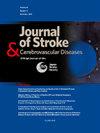Gut microbiota-derived phenylacetylglutamine mitigates neuroinflammation induced by intracerebral hemorrhage in mice
IF 1.8
4区 医学
Q3 NEUROSCIENCES
Journal of Stroke & Cerebrovascular Diseases
Pub Date : 2025-05-28
DOI:10.1016/j.jstrokecerebrovasdis.2025.108357
引用次数: 0
Abstract
Background
Emerging evidence highlights the pivotal role of gut microbiota and its metabolites in the pathogenesis of brain injury following intracerebral hemorrhage (ICH). Microglia-mediated neuroinflammation stands out as a crucial pathophysiological process post-ICH. However, the effects of gut microbiota on microglia-mediated neuroinflammation after ICH remain elusive. This study aims to address three key aspects: 1) the alteration in gut microbiota-related metabolites following ICH. 2) the impact of phenylacetylglutamine (PAGIn), a gut microbiota-derived compound, on microglia-mediated neuroinflammation after ICH, and 3) the detailed mechanism by which PAGIn regulates microglia-mediated neuroinflammation via β2 adrenergic receptor (β2AR) after ICH.
Methods
Young male mice were subjected to ICH through the administration of type VII collagenase. Plasma samples were collected for metabolomic profiling on day 3 after ICH. Microglia phenotype and neuroinflammation were assessed after ICH. Brain tissues were collected for bulk RNA sequencing following PAGIn treatment. Behavioral functions were assessed using the cylinder, corner and forelimb placement tests.
Results
Following ICH, levels of PAGIn in the plasma, brain tissues decreased. The supplementation of PAGIn exhibited a significant reduction in neuroinflammation, facilitated the transformation of microglia to anti-inflammatory phenotype, and alleviated neurological dysfunction. Furthermore, the protective effects of PAGIn post-ICH were mediated through the regulation of β2AR.
Conclusion
Gut microbiota-derived PAGIn played a crucially regulatory role in microglia-mediated neuroinflammation via β2AR after ICH. The supplementation of PAGIn following ICH in mice emerged as a potential therapeutic strategy to mitigate ICH-induced brain injury.
肠道微生物源性苯乙酰谷氨酰胺减轻小鼠脑出血引起的神经炎症。
背景:新出现的证据强调了肠道微生物群及其代谢物在脑出血(ICH)后脑损伤发病机制中的关键作用。小胶质细胞介导的神经炎症是脑出血后重要的病理生理过程。然而,肠道微生物群对脑出血后小胶质细胞介导的神经炎症的影响仍然难以捉摸。本研究旨在解决三个关键方面:1)ICH后肠道微生物相关代谢物的改变。2)肠道微生物源化合物苯乙酰谷氨酰胺(PAGIn)对脑出血后小胶质细胞介导的神经炎症的影响;3)PAGIn通过β2肾上腺素能受体(β2AR)调节脑出血后小胶质细胞介导的神经炎症的详细机制。方法:通过注射VII型胶原酶致年轻雄性小鼠脑出血。脑出血后第3天采集血浆样本进行代谢组学分析。脑出血后评估小胶质细胞表型和神经炎症。在PAGIn治疗后,收集脑组织进行大量RNA测序。采用圆柱体、角形和前肢放置试验评估行为功能。结果:脑出血后血浆、脑组织中PAGIn水平降低。补充PAGIn可显著减少神经炎症,促进小胶质细胞向抗炎表型转化,减轻神经功能障碍。此外,PAGIn的保护作用是通过调节β2AR介导的。结论:肠道微生物来源的PAGIn通过β2AR在脑出血后小胶质细胞介导的神经炎症中发挥重要的调节作用。在小鼠脑出血后补充PAGIn是一种潜在的治疗策略,可以减轻脑出血引起的脑损伤。
本文章由计算机程序翻译,如有差异,请以英文原文为准。
求助全文
约1分钟内获得全文
求助全文
来源期刊

Journal of Stroke & Cerebrovascular Diseases
Medicine-Surgery
CiteScore
5.00
自引率
4.00%
发文量
583
审稿时长
62 days
期刊介绍:
The Journal of Stroke & Cerebrovascular Diseases publishes original papers on basic and clinical science related to the fields of stroke and cerebrovascular diseases. The Journal also features review articles, controversies, methods and technical notes, selected case reports and other original articles of special nature. Its editorial mission is to focus on prevention and repair of cerebrovascular disease. Clinical papers emphasize medical and surgical aspects of stroke, clinical trials and design, epidemiology, stroke care delivery systems and outcomes, imaging sciences and rehabilitation of stroke. The Journal will be of special interest to specialists involved in caring for patients with cerebrovascular disease, including neurologists, neurosurgeons and cardiologists.
 求助内容:
求助内容: 应助结果提醒方式:
应助结果提醒方式:


